|
|
|
Sort Order |
|
|
|
Items / Page
|
|
|
|
|
|
|
| Srl | Item |
| 1 |
ID:
024401
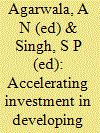

|
|
|
|
|
| Publication |
London, Oxford University Press, 1969.
|
| Description |
x, 630p.
|
|
|
|
|
|
|
|
|
|
|
|
Copies: C:1/I:0,R:0,Q:0
Circulation
| Accession# | Call# | Current Location | Status | Policy | Location |
| 003377 | 332.6731722/AGA 003377 | Main | On Shelf | General | |
|
|
|
|
| 2 |
ID:
103414
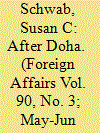

|
|
|
| 3 |
ID:
106645
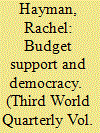

|
|
|
|
|
| Publication |
2011.
|
| Summary/Abstract |
Budget support-aid delivered directly to developing country government budgets-accounts for a growing proportion of overseas development assistance. In theory it has multiple benefits over other forms of aid in terms of attaining poverty reduction and development objectives. However, recent years have seen several incidents of budget support being frozen, halted or redirected because of slippage in the democratic credentials of certain countries, including Ethiopia, Uganda, Nicaragua, Honduras, Madagascar and Rwanda. This article analyses these incidents in relation to debates over aid conditionality. It finds that donors are willing to apply political conditionality when otherwise good performing governments go politically astray, but it questions whether budget support is a viable instrument for pushing for democratic change. Co-ordinated donor action appears to be increasing, but aid flows to the countries discussed remain high and the governments in question tend to be dismissive in the face of such pressure.
|
|
|
|
|
|
|
|
|
|
|
|
|
|
|
|
| 4 |
ID:
111259
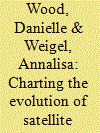

|
|
|
|
|
| Publication |
2012.
|
| Summary/Abstract |
This paper analyzes the historical paths of eight countries - from Africa, Asia and Latin America - as they have pursued technological capability in the area of space technology. The analysis is unfolded in three stages. The first stage introduces a framework called the Space Technology Ladder. This Ladder framework posits a path through four major technology categories, as follows: 1) establishing a national space agency; 2) owning and operating a satellite in low Earth orbit; 3) owning and operating a satellite in geostationary orbit; and 4) launching satellites. The second stage of the analysis uses data to create a graphical timeline, by mapping the historical achievements of the eight countries onto the Ladder framework. The results provide information about the similarities and differences in the technology strategies of the various countries. The third stage is a discussion of the strategic decisions faced by the countries under study. Exploring their diverse strategies is an initial step toward developing prescriptive theory to inform developing country space programs.
|
|
|
|
|
|
|
|
|
|
|
|
|
|
|
|
| 5 |
ID:
099328
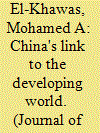

|
|
|
| 6 |
ID:
169897


|
|
|
|
|
| Summary/Abstract |
Project finance (PF) is a powerful tool for mobilizing capital for renewable energy (RE) projects but faces challenges in developing countries. This paper examines factors driving the financing method choice between project finance (recourse exclusively to project assets) and corporate finance (recourse to parent company assets), including the feed-in tariff (FIT), using the Philippines as a case study for a developing country. After the RE Law was approved in 2008, RE capacity increased but RE share in energy mix decreased. FIT resulted in increased investments in RE, primarily in solar and wind. Results show that PF incidence is higher for baseload, high-capacity utilization, non-intermittent technologies; non-FIT projects with revenue contracts; and larger projects owned by public companies. Contrary to expectation, PF was less utilized for FIT-eligible RE, and projects owned by private or small investors. PF was utilized primarily by well-capitalized investors, and mostly by power and financial companies. The Philippine FIT's tight deadlines and low technology-specific capacity caps increased revenue uncertainty, resulting in high concentration of project ownership and potential erosion of public support. Given the intrinsic uncertainty of RE and developing countries, policymakers need to design policies to minimize revenue uncertainty, enable PF and broaden the investor base.
|
|
|
|
|
|
|
|
|
|
|
|
|
|
|
|
| 7 |
ID:
180868


|
|
|
|
|
| Summary/Abstract |
Increasing variable renewable energy penetration, climate change, and global uncertainties will make it harder to stabilize and balance power systems. This situation will be especially challenging for developing economies with limited capital and institutional capacity, poor infrastructure, and rapid economic growth. Using the Philippines as a case study for a developing economy, the paper identified chronic underinvestment in the supply of ancillary services that play a crucial role in balancing energy supply with demand and building grid resilience. To diagnose the cause, the paper created a novel dataset with all ancillary services revenue contracts in effect at the end of 2019 and analyzed their key terms and conditions. The paper concludes that these contracts are not conducive to financing due to short durations, low and soft buying commitments, exclusive focus on incumbent versus new entrants, hour and season constraints, and a poorly implemented remuneration methodology. The literature rarely analysis this topic from a financing perspective and at this level of detail. Revenue contracts need to switch to long-term, firm, and technology-specific cost recovery mechanisms with new entrants, to incentivize financing. Storage technologies such as batteries and hydropower should be prioritized, followed by gas turbines. These changes will result in a more secure, resilient, and affordable power system.
|
|
|
|
|
|
|
|
|
|
|
|
|
|
|
|
| 8 |
ID:
101084


|
|
|
|
|
| Publication |
2010.
|
| Summary/Abstract |
By bridging the gap between domestic savings and investment and bringing the latest technology and management know-how from developed countries, foreign direct investment (FDI) can play an important role in achieving rapid economic growth in developing countries. Developing countries have not been considered as favourable destinations for FDI as developed countries. Moreover, among the developing countries a few, such as China, India, Nigeria and Sudan, are the major recipients of FDI, with the rest vying for the scraps. Using panel data from 68 low-income and lower-middle income developing countries, this article strives to identify the factors that determine FDI inflow to developing countries. Based on a comparative discussion focussing on why some countries are successful in attracting FDI, the article demonstrates that countries with larger GDPs, higher GDP growth rates, higher proportion of international trade and a more business-friendly environment are more successful in attracting FDI.
|
|
|
|
|
|
|
|
|
|
|
|
|
|
|
|
| 9 |
ID:
167804
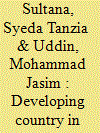

|
|
|
|
|
| Summary/Abstract |
Since the end of World War II, Bretton Woods system remains in the midst of Global Economic Governance (GEG). International Monetary Fund (IMF) was created to regulate monetary policy, International Bank for Reconstruction and Development (IBRD), then World Bank (WB) was formed to look into financial aid and lending, and General Agreement on Tariffs and Trade (GATT), then World Trade Organization (WTO) was established to regulate trade. These institutions are yet to provide much space for effective participation of developing states and are dominated by developed world like United States (US), European Union (EU), etc. Hence, a vital target of Goal 16 of Sustainable Development Goals (SDGs) is to broaden and strengthen the participation of developing states in global governance institutions. Global financial crisis and economic rise of China and India have resulted in large-scale participation of developing states in global economic governance. Being a developing country, Bangladesh will be benefitted and able to broaden its participation from exercising practices of China and India in the institutions of global economic governance.
|
|
|
|
|
|
|
|
|
|
|
|
|
|
|
|
| 10 |
ID:
150359


|
|
|
|
|
| Summary/Abstract |
We present forecasts of the energy consumption of Morocco towards 2030. Two models have been developed and their results compared: one based on the energy intensity (IE) and another one on a link with the country urbanization rate (URB). The IE model allowed to segment energy consumption in four posts while the URB model only in two posts. For the sensitivity analysis to economic growth, three future GDP evolution scenarios are proposed. The retrospective correlations of both models are excellent but their future extrapolations finish in slightly different results. Through their correlation to electricity consumption, peak power forecasts are also presented. A forecast of the country energy intensity is commented. As the average yearly increase of electricity should still be between 4.9% and 7.1% during 2020–2030, the electric equipment program continuation after 2020 must soon be clarified and avoid the former implementation delays. As the white combustibles needs should yearly increase between 6.3% and 7.8% in 2020–2030, electrical equipment programs should also make provisions for the case of deployment of electric cars. Butane subsidies widen the gap with other fuels and must be removed very soon possible to reduce the growth of its consumption and energy intensity.
|
|
|
|
|
|
|
|
|
|
|
|
|
|
|
|
| 11 |
ID:
032608


|
|
|
|
|
| Publication |
London, Charles Knight, 1973.
|
| Description |
vii, 123p
|
| Standard Number |
0853141649
|
|
|
|
|
|
|
|
|
|
|
|
Copies: C:1/I:0,R:0,Q:0
Circulation
| Accession# | Call# | Current Location | Status | Policy | Location |
| 012847 | 332.673091724/ALL 012847 | Main | On Shelf | General | |
|
|
|
|
| 12 |
ID:
120078


|
|
|
|
|
| Publication |
2012.
|
| Summary/Abstract |
In the backdrop of persistent trade deficit, Bangladesh has been extensively liberalizing its trade regime since 1992 in order to achieve higher export performance and GDP growth. However, despite the liberalization, imports are still growing faster than exports, increasing trade deficit. The article empirically examines the impacts of trade liberalization on export performance in Bangladesh, using the ARDL 'Bounds Test' approach with annual time series data. Empirical results indicate that trade liberalization is having statistically significant but low impact on aggregate export. Neither capital stock as a technology transfers nor liberalization through reduction and withdrawal of export duties shows a significant impact on export performance. Exports are mostly stimulated by GDP growth. The interaction of liberalization with GDP increases exports a little, hence improving the trade balance. However, the liberalization enhances imports compared to exports hence the trade deficit. Therefore, a combined and consistent policy to promote GDP growth, technology transfers and domestic price stability, including education, infrastructures and backward linkage industries is essential in order to achieve higher export performance in Bangladesh.
|
|
|
|
|
|
|
|
|
|
|
|
|
|
|
|
| 13 |
ID:
178837


|
|
|
|
|
| Summary/Abstract |
Trinidad and Tobago's oil and gas industry is well established and is one of the oldest in the world, which has led to a large and growing number of oil and gas Knowledge Intensive Business Services (KIBS) firms. These firms provide advanced technological or professional knowledge as intensive inputs into the business processes of other organizations. This paper aims to investigate innovation in KIBS firms in the oil and gas sector in Trinidad and Tobago, and to identify market and government failures that hinder their development to inform policy making. The factors that increase KIBS firm's likelihood of introducing an innovation are firm size, age, number of customers, internal research and development, and the use of external information. Moreover, several market failures hinder their potential for innovation and technology diffusion, including information asymmetries, difficulty in obtaining finance, lack of appropriate skills, and limited partnerships/collaboration with research institutions. This study recommends the development of a national innovation policy and program, greater dialogue, and clear communication channels among all industry stakeholders, and the expansion of several existing local policy initiatives, including trade missions and corporate governance programs and training and skills through tertiary educational institutes.
|
|
|
|
|
|
|
|
|
|
|
|
|
|
|
|
| 14 |
ID:
099033
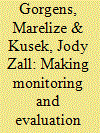

|
|
|
|
|
| Publication |
Washington, DC, World Bank, 2009.
|
| Description |
xxxi, 493p.
|
| Standard Number |
9780821381861
|
|
|
|
|
|
|
|
|
|
|
|
Copies: C:1/I:0,R:0,Q:0
Circulation
| Accession# | Call# | Current Location | Status | Policy | Location |
| 055294 | 352.357091724/GOR 055294 | Main | On Shelf | General | |
|
|
|
|
| 15 |
ID:
097499


|
|
|
|
|
| Publication |
2010.
|
| Summary/Abstract |
The challenges faced by the developing countries are unique in that they need to meet the increasing energy demands for their economic growths at a competitive price without damaging the environments. In this paper, a case study on the electricity demand issue in Sabah, Malaysia, is presented to investigate potential solutions in addressing this current need for a typical developing economy from the technical, economical and environmental perspectives. Sabah, one of the 13 states in Malaysia, is currently experiencing a serious power shortage, especially at the east coast. A 300 MW coal plant is proposed by the electricity utility company. However, the proposal has been rejected in the past several years due to the negative environmental impacts of the plant. In this paper, a number of alternative solutions were evaluated and proposed with respect to the viability of technologies, financial return and minimum environmental impact in terms of GHG emission.
|
|
|
|
|
|
|
|
|
|
|
|
|
|
|
|
| 16 |
ID:
095380


|
|
|
|
|
| Publication |
2010.
|
| Summary/Abstract |
Why did some developing country governments accumulate large foreign debt burdens in the late twentieth century while others did not? I hypothesize that variation in foreign indebtedness is a product of the impact of regime type on government borrowing and investment decisions. Autocratic regimes will borrow more from foreign lenders and invest fewer of these funds in public goods than democratic regimes. Consequently, autocracies are more likely to develop large foreign debt burdens than democracies. I test this hypothesis by estimating error correction models against a sample comprising 78 developing countries between 1976 and 1998. The analysis suggests that autocratic governments accumulated substantially larger foreign debt relative to their national income than democratic governments. The analysis has implications for the likely consequences of contemporary debt relief initiatives.
|
|
|
|
|
|
|
|
|
|
|
|
|
|
|
|
| 17 |
ID:
184121


|
|
|
|
|
| Summary/Abstract |
Using three definitions of the middle class (MC) and the Pakistan Social and Living Standards Measurement surveys from 2004 to 2014, we estimated the size of the MC and examined the correlates and consumption patterns of the MC for Pakistan. According to the absolute income, relative income and asset–ownership definitions, the MC grew by 16%, 8%, and 10%, respectively, from 2004 to 2014. The results of the biprobit model showed that the probability of entering the MC was associated with higher education, urban residence and non-agricultural employment. Additionally, the MC was associated with greater consumption of ordinary and luxury goods.
|
|
|
|
|
|
|
|
|
|
|
|
|
|
|
|
| 18 |
ID:
103947


|
|
|
|
|
| Publication |
2011.
|
| Summary/Abstract |
This article tests the validity of a Forward Discount Bias Puzzle, in a small open developing economy (SODE)-Sri Lanka-by employing first an unstructured vector autoregression (VAR) model and then a structured VAR model. The author argues that empirical examinations concerning SODEs cannot merely replicate methodology followed in testing developed economies, and identifies the need to disentangle capital flows from interest rate changes by including both capital flow and monetary policy variables. The article finds no evidence of a Forward Discount Bias Puzzle in Sri Lanka, and that perfect capital mobility is a too strong assumption. Hence, it proves that empirically more appropriate approach is to assume some capital mobility and incorporate capital flow data to accommodate for this change, in the analysis of UIRP.
|
|
|
|
|
|
|
|
|
|
|
|
|
|
|
|
| 19 |
ID:
173317
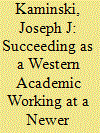

|
|
|
|
|
| Summary/Abstract |
This article discusses the two most important things that I have learned since taking a full-time position in 2014 at a newer private university in the Balkans: (1) the unique challenges you face when doing research in such a setting; and (2) how to handle the significant cultural differences that you will face in the classroom. This article also offers recommendations for earning the trust of students who will be suspicious of your motivation for teaching in their country. If you can manage these two realities, you will have a much easier time finding personal fulfillment and, ultimately, professional success in your new endeavor. This article focuses primarily on teaching in newer, private institutions known as Foundation Universities in developing countries more than long-established public institutions. However, you most certainly will face issues in these public institutions similar to those at smaller private ones.
|
|
|
|
|
|
|
|
|
|
|
|
|
|
|
|
| 20 |
ID:
147514


|
|
|
|
|
| Summary/Abstract |
Nowadays we witness a fundamental change in the perception of space-related issues. Once being a symbol of technological race and competition between opposing political systems, space studies have become a part of everyday life and an indispensable means in achieving economic, scientific, political and social goals. This research addresses space studies of Turkey -a late comer but rapidly progressing country in this field-which is recently emerging in the area of high technologies. In this context, major policies and projects which have brought the country to its present level are discussed. The current status of Turkish space industry is defined through SWOT analysis and a proposal for the country's space vision covering the next 20 years is put forward. Strategies and policies that will be supportive in achieving the proposed space vision are introduced.
|
|
|
|
|
|
|
|
|
|
|
|
|
|
|
|
|
|
|
|
|